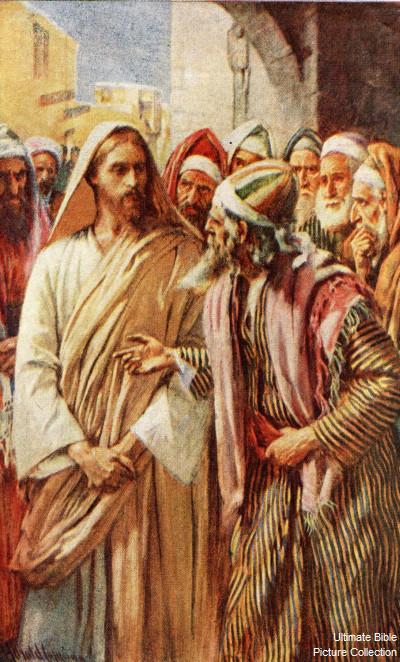JESUS ASSURES US OF THE RESURRECTION OF THE BODY
(Biblical reflection on the 32nd Ordinary Sunday [Year C] – November 10, 2013)
Gospel Reading: Luke 20:27-38
First Reading: 2Maccabees 7:1-2,9-14; Psalms: Psalm 17:1,5-6,8,15; Second Reading: 2Thessalonians 2:16-3:5
Scripture Text:
There came to Him some Sadducees, those who say that there is no resurrection, and they asked Him a question, saying, “Teacher, Moses wrote for us that if a man’s brother dies, having a wife but no children, the man must take the wife and raise up children for his brother. Now there were seven brothers; the first took a wife, and died without children; and the second and the third took her, and likewise all seven left no children and died. Afterward the woman also died. In the resurrection, therefore, whose wife will the woman be? For the seven had her as wife.
And Jesus said to them, “The sons of this age marry and are given in marriage; but those who are accounted worthy to attain to that age and to the resurrection from the dead neither marry nor are given in marriage, for they cannot die any more, because they are equal to angels and are sons of God, being sons of the resurrection. But that the dead are raised, even Moses showed, in the passage about the bush, where he calls the Lord the God of Abraham and the God of Isaac and the God of Jacob. Now He is not God of the dead, but of the living; for all live to Him.” (Luke 20:27-38 RSV)
The ancient Greeks, such as Plato, had a clearer idea of personal immortality than the Israelites did. The Book of Wisdom, written about 50 B.C., contains the Old Testament’s most vivid concepts of the future life; not surprisingly, this originated from a strong Greek influence.
The hazy Hebrew notion of the afterlife centered around the word “Sheol”, meaning the “the grave”. This was a vague and shadowy type of survival, a very unappealing one. It Was much better to live on earth than in Sheol, which explains why the Hebrews interpreted a short life as a punishment and a long life as a reward from God.
Under Greek and Persian influence, Pharisees professed belief in the future life and in the resurrection of the body. The Sadducees, a more conservative group, believed in neither. Jesus basically agreed with the Pharisees on this question. The Sadducees took exception to this and thus set the scene for the confrontation in today’s Gospel. They tried to negate the possibility of resurrection and deflate the teaching of Jesus by posing the example of a woman who had been married to seven brothers. “At the resurrection of the dead,” they gleefully inquired, “which one will be her husband ……?” Jesus simply restated His teaching on the resurrection, and then explained that life in eternity would be different and that such problems would not arise. Our Lord’s answer was good, but His best answer would come later with His own personal resurrection from the grave.
In all ages and places, Christians have professed and proclaimed their belief in the immortality of the soul and the resurrection of the body. This central truth of our religion is dramatized liturgically at the annual Easter celebration and at every Mass which is offered. It is the message which gives meaning to our funeral liturgies, and is symbolized by the presence of the burning Easter candle. From early times, we as a Church have professed in the creed our belief “in the resurrection of the body and life everlasting.”
As Jesus triumphed over the objections of the Sadducees, we too must triumph over doubt and opposition. We are citizens of both earth and heaven. Death is our sister, our second birthday – our birthday into eternity. Since we are not angels but humans, we are incomplete without our bodies. Jesus therefore assures us that there will be a resurrection of the body. Then we will finally have it all together – forever.
At Mass today, let us lift up our hearts to heaven. Let us gaze upon the beauty of the Lord, and let His glory and His majesty pierce us to the core. After all, He is the ONE who created us to worship Him in the first place!
Prayer: Heavenly Father, we are in awe of Your love for us. Continue to reveal to us who You are so that we can become more and more like You. Amen.
